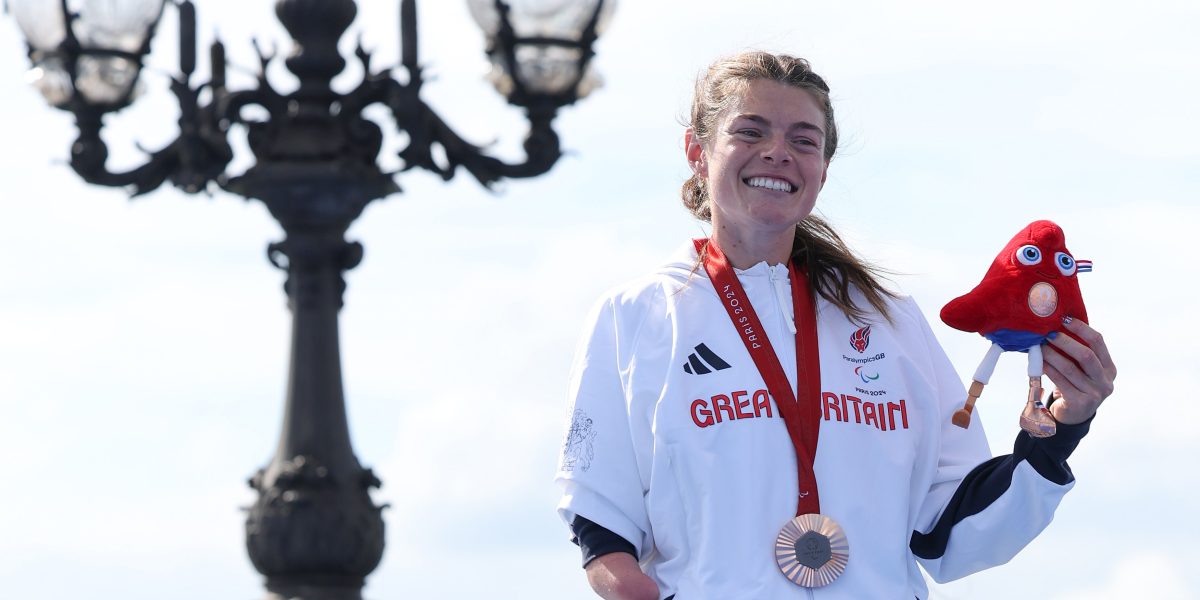For British triathlete Lauren Steadman, clinching a spot on the podium at the 2024 Paralympic Games was especially meaningful: The bronze medalist lives with long COVID, which made her path to Paris particularly challenging.
In March, the 31-year-old got sick with COVID while traveling home from a canceled race in Abu Dhabi. The virus severely affected her breathing and sidelined her from training for several weeks, according to Tri247, and its effects lingered. “COVID attacked my central nervous system, and I’ve had long COVID since,” she told BBC Sport in July.
Steadman was only cleared by doctors to race again six weeks before the Paralympic Games. At the time, Steadman told BBC Sport she didn’t feel ready for Paris, but her team was working on a plan to get her prepared.
That made just getting to the start line at the Paralympics even more impressive. During the race on September 2, Steadman found herself in a tight battle against British teammate Claire Cashmore and American Grace Norman through the swim and bike portion of the women’s paratriathlon PTS5, until the Team USA standout broke away on the run. Cashmore finished second, and Steadman clinched bronze. (The PTS5 classification is for mild impairments in which amputee athletes may use approved prosthesis or other supportive devices in both bike and run segments.)
“I had zero expectations today. COVID threw a massive spanner in the works for me. If I would have said to you I would do a hard run a few months ago, I’d be in bed for two days,” she told Tri247. “Just to be on the start line [today] was fantastic.”
According to the CDC, long COVID is a chronic condition that occurs after initial COVID infection and symptoms last at least three months. People with long COVID can experience fatigue, difficulty breathing, heart palpitations, and difficulty concentrating, among other symptoms. Many times, folks can feel worse after exerting physical effort.
Following her bronze win, Steadman told Paralympics GB she was still dealing with long COVID after being diagnosed six months ago, which made the podium finish even more special.
“It took everything I had to be there,” she told the national governing body. “And I wasn’t sure if I’d be on the podium, so I just wanted to bring home a medal for Paralympics GB.”
Coming into the Paralympic Games as the defending champion also made the buildup tougher, but Steadman’s experience—including a highly anticipated return to the sport after struggling with the comedown after the Tokyo Paralympics—ultimately helped her shift her mindset going into the race in Paris.
“I would have liked to have been 10 times stronger yesterday, but actually when I was lying in bed so unwell, it kind of put everything in perspective that actually I still get to go, I’ll do my best on the day, and I just didn’t want to let everybody at home down,” she told Paralympics GB.
Now with three Paralympic medals highlighting a legendary career, Steadman told BBC Radio Manchester that Paris would likely be her last Summer Games. She plans to continue her PhD at the University of Portsmouth, where she is studying the mental health of athletes. She also hopes to qualify for the 2026 Milan Winter Paralympic Games in cross-country skiing.
“I think it’s a good time to bow out when you’re actually happy and have enjoyed something, so I love triathlon, I love riding my bike, but perhaps not to the performance standard that I’m normally at,” she told BBC.
SELF is your go-to source for all things Paralympics. Follow our coverage of the Paris Games here.
Related:
- If You’re Not Following the Perfectly Unserious Paralympics TikTok Account, You’re Missing Out
- Do Paralympic Guides Get Medals If Their Athletes Win?
- What Is Goalball—And Why Are All the Athletes Wearing Black-Out Goggles?
Get more of SELF’s great health coverage delivered right to your inbox—for free.
